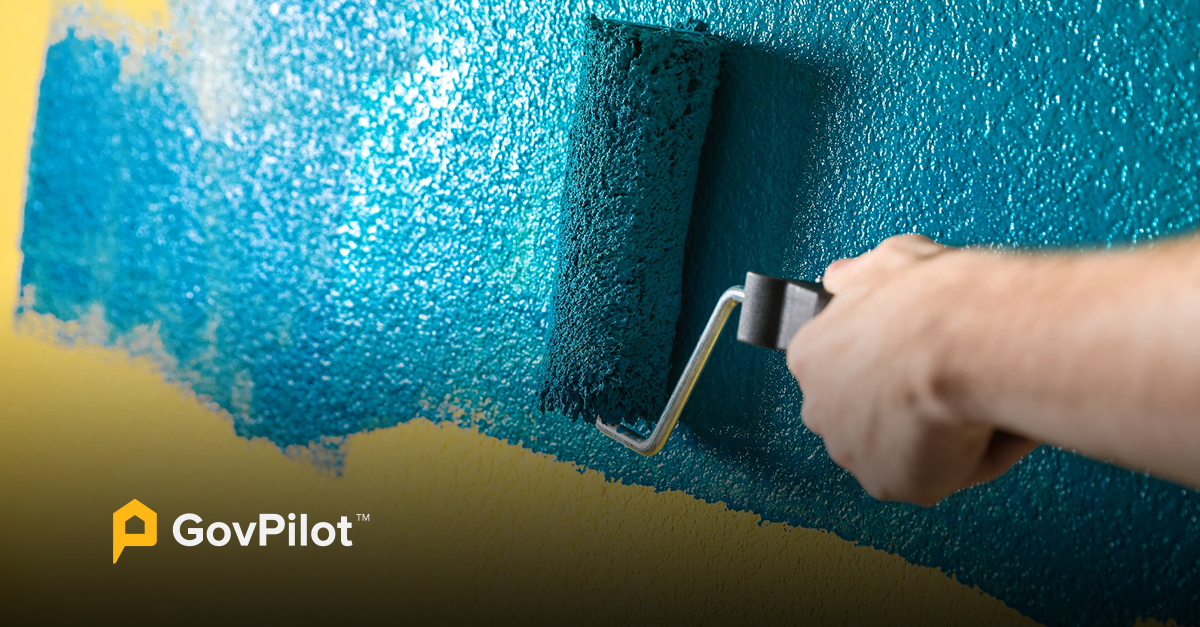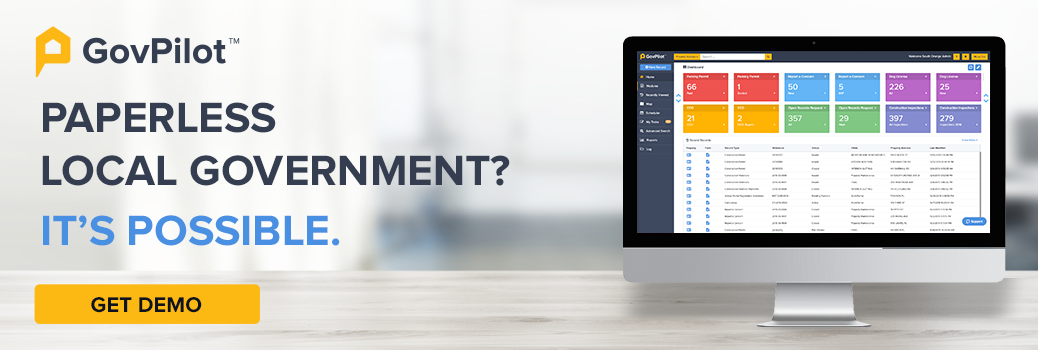Most of us are aware of the horrible health and developmental repercussions that come with lead paint, and hopefully had it removed from our residences and commercial properties decades ago. Yet, the unfortunate truth is that many citizens are still breathing in toxic fumes as a result of lead paint.
The New Jersey state government recently took the proactive decision to establish lead-based paint hazard programs and require specific lead-based paint inspections for local governments to enforce.
In this article, we’ll highlight the key aspects of the 2021 lead-based paint law and related New Jersey legislation passed in 2022 regarding inspections of rental dwellings. Plus, you will learn the best practices for efficiently managing inspection workflows.
For readers NOT located in New Jersey: keep in mind that your state may already have similar regulations on the books or may be looking to implement similar legislation soon. The following guide may still be useful for you.
What is the NJ Lead-Based Paint Law?
In July 2021, Governor Phil Murphy signed NJ P.L. 2021 chapter 182 into law to require regular inspection of single-family and multifamily residential properties to ensure that people are not being exposed to hazardous lead-based paint in their homes. In 2022, a new policy was enacted by the state outlining further details around “lead-based paint inspections in rental dwelling units” and the critical steps for local government inspections.
Why is the NJ State Government Taking Action to Inspect for Lead-Paint?
Lead-based paint poisoning is related to a series of major health complications due to inhalation or ingestion of dust containing microscopic amounts of lead. Common health issues related to lead-paint include brain damage, kidney damage, anemia, and more in adults and can cause developmental problems in children.
As a result, the Garden State recognizes that far too many New Jerseyans have been breathing in this toxic air at their residences due to a lack of enforced regulations. Regular inspections of rental dwellings required by recent legislation will ensure that no family is forced to undergo lead paint poisoning.
What Inspection Protocols Do Local Government Officials Need to Take?
The state provides an insightful lead-based paint inspection resource highlighting how inspections should be performed and how to proceed towards remediation if lead paint is discovered.
Key Takeaways Regarding Lead-Based Paint Inspection Processes
1. Who is eligible to perform inspections?
The policy allows, “lead evaluation contractors,” or a “lead inspector or risk assessor” approved by the Department of Health to perform lead-based paint inspections. Your local government can have an employed inspector handle the work in your locality and / or work in tandem with lead paint certified private-sector partners to perform the necessary dust swabs required by state law.
Pro Tip: Since property-owners will be seeking out inspectors themselves, you can save your citizens time with a landing page on your local government website. If your government is performing the inspections yourselves, property owners can schedule inspections directly online. If you’re outsourcing the work to privately owned inspectors, provide your constituents with their contact information.
2. How often are inspections required?
The law requires “periodic lead-based paint inspection,” within two years of the official effective date (July 22, 2022) OR when a tenant moves out, depending on which happens first. Beyond the two year period, inspections will need to occur every three years or with each tenant turnover.
3. What is expected of local governments?
Local governments are required to set up a permanent local agency for, “for the purpose of conducting inspections and enforcing laws, ordinances, and regulations concerning buildings and structures within its jurisdiction.” Local government departments you might consider including in the inspection processes are code enforcement, “local building agencies, health agencies, and housing agencies.”
Your local leadership must also allow, “permit dwelling owners/landlords to directly hire a certified lead evaluation contractor for [performing inspections],” and keep orderly records around past inspections, inspection scheduling, tenant turnovers, and the issuance of lead-safe certifications.
Communities are expected to perform one of two specific inspection types: a visual or dust wipe form of sampling. Every NJ local government can find their required inspection type in the Municipal Listings - Visual or Dust Wipe Inspections for NJ Local Governments document from NJ.gov.
4. What happens if a dwelling is in violation of the lead-based paint laws?
If violations of the NJ lead-based paint inspection law are violated, property owners have 30 days to address the needed abatement efforts. Abatement agencies or individuals that are certified by the NJ Department of Community Affairs, the NJ Department of Health, or the Environmental Protection Agency are legally allowed to perform remediation techniques.
Your local government has the authority to investigate failed compliance and issue penalties if a dwelling owner doesn’t take action towards remediation. Fines up to $1000 per week can be issued if action towards remediation does not occur within the outlined 30 day period.
Learn more about How to Manage Fee & Fine Processing in Local Governance.
5. What types of properties are exempt from lead paint inspections?
When determining the properties your local government will need to perform inspections on, keep in mind that the following types of dwellings are exempt:
- Buildings constructed in 1978 or later
- Seasonal rentals with tenants signing non-consecutive 6 month or less leases
- Buildings that have been inspected and certified to be lead free by the NJ Association of Counties
- Multifamily properties, “registered with the Department of Community Affairs for at least ten years and have no outstanding lead violations from the most recent cyclical inspection performed on the multiple dwelling under the ‘Hotel and Multiple Dwelling Law.’”
How to Efficiently Conduct Lead-Based Inspections (& Beyond)
Government software is integral to modern inspection processes and property record data storage. Here are the key ways going digital will assist in your lead-based paint inspection workflows:
With the web-based GovInspect application from GovPilot, inspectors can take notes regarding the visual and / or during the inspection processes and take notes about the status of lead-based paint at the property directly on their tablet or cell phone. Records will be instantly stored in the cloud where inspection documents can be pulled up by government officials for each property in seconds.
Keep in mind, this technology can be used for health inspections as well as other types of building inspections too.
-
Online Inspection Scheduling
Your local government is required to have an agency established to handle the inspection process. Making inspection requests available from your website is the most straightforward approach to managing lead-based paint inspections. Once a property owner enters their dwelling address and information into the system, the government technology will automatically assign the inspection to a relevant government official (or licensed partner.)
Learn more about local government automation in our guides: How Robotic Process Automation Saves Governments Time & Money and Modern Local Government Innovation Strategies to Consider.
-
Simplified Property Record Management With Government GIS Mapping
With a simple 3D GIS map, relevant government officials can pull up property records for lead-based paint inspections and beyond in just a few clicks. Government cloud storage is undoubtedly the most efficient approach to meet the state policy requiring inspection record keeping by municipalities.
-
Online RFPs
You should have a list of licensed lead-based paint agencies and individuals listed on your website for property owners to utilize. With online requests for proposals, lead-paint inspectors can fill out an online form to let your local government and citizens know that they are available to inspect dwellings in your neighborhood, which can then be shared from your site to the public.
Learn more about Driving Local Economic Development as a Municipality.
-
Online Fee Collection
The state government expects your locality to issue fines to penalize property owners that fail to address lead-based paint issues. Given that fines are to be issued every 7 days that a lead paint issue is not remediated (beyond the first 30 day grace period,) your local government needs easy means to issue and pay fines. Luckily, government software credit card integrations allow local governments to collect these fees online.
Managing Lead Paint Inspections & Beyond
With New Jersey’s sensible decision to assure citizens that their living spaces are lead-based paint free, your local government will need to step up to determine the properties that need inspections in your community, perform the inspections, and enforce the lead-based paint policies laid out in NJ P.L. 2021 chapter 182.
In order to schedule inspections, organize property records, and enforce lead-based paint ordinances, the key to efficiency is embracing digital transformation. To learn how GovPilot can help, book a free demo.
NJ Lead-Paint Law FAQs
What is NJ P.L. 2021 Chapter 182?
NJ P.L. 2021 chapter 182, typically known as the lead-based paint inspection law, was passed on July 22, 2022, and requires various types of residential properties to be inspected for hazardous lead-based paint. Local governments in NJ are expected to perform inspections, keep inspection records about all properties in their jurisdiction organized, and enforce lead paint violations.
How Does Government Technology Help With Lead-Based Paint Inspections?
- Government inspection software makes it easy to schedule lead-based paint inspections and store inspection records in the cloud
- Online government data storage makes it easy to store the never ending supply of property records related to lead-based paint inspections and beyond.
- Online fee and fine processing makes it easier to enforce ordinance violations with property owners regarding lead paint
- Government social media pages can / should be used to educate property owners and renters about the dangers of lead-based paint and requirements for inspections given NJ law.
- Online RFPs allow licensed lead-based paint inspectors to get on your local government and citizens’ radars. Once private-sector inspectors apply, it is recommended to include them on a resource page about lead-based paint inspections on your government website.
Read on for the latest government trends:
- NJ Electronic Construction Permitting Law: Everything for Local Governments to Know
- NJ Certificate of Liability Insurance Law: Everything for Local Governments to Know
- Federal Cybersecurity Grants for Local Governments: Everything to Know
- US Infrastructure Bill: What the Bill Means for Local Governments
- American Rescue Plan Act: What the Bill Means for Local Governments
- Challenges Local Governments Will Face for Years to Come
- Local Government Strategic Planning Strategy & Examples
- Local Government Code Enforcement Strategy
- Local Government Water Utilities Strategy
- Local Government Analytics: Tips & Considerations
- Managing and Improving Local Public Meetings
Sources:
https://www.epa.gov/sites/default/files/documents/bldg-mgr-brochure.pdf
https://www.nj.gov/dca/divisions/codes/resources/leadpaint.html
https://www.mayoclinic.org/diseases-conditions/lead-poisoning/symptoms-causes/syc-20354717







